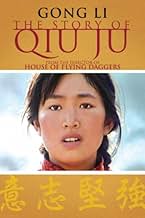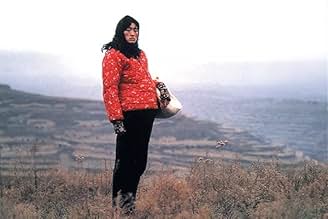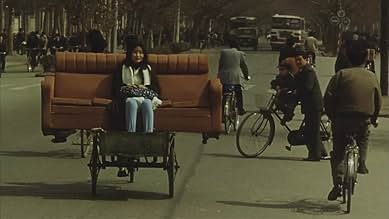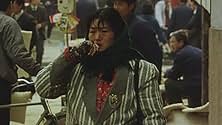AVALIAÇÃO DA IMDb
7,5/10
7 mil
SUA AVALIAÇÃO
Adicionar um enredo no seu idiomaA peasant woman seeks justice after the headman of her village has kicked her husband in the groin.A peasant woman seeks justice after the headman of her village has kicked her husband in the groin.A peasant woman seeks justice after the headman of her village has kicked her husband in the groin.
- Direção
- Roteiristas
- Artistas
- Prêmios
- 19 vitórias e 9 indicações no total
- Direção
- Roteiristas
- Elenco e equipe completos
- Produção, bilheteria e muito mais no IMDbPro
Avaliações em destaque
Really enjoyed this one. Qiu Ju is the wife of a man who has been kicked by a neighbor, his village chief. She presses for an apology, largely (if subtitles do it justice) because, even though his chest is what hurts longer, he's been kicked in the "privates" and she wants more than one child. She takes her quest for the apology up the chain of officialdom.
I couldn't get enough of the scenery - houses, city, carts, clothes, painted paper banners, dried peppers and corn - and the faces of people. As other viewers noted positively, the people in it didn't seem to be actors but real people, caught up in daily affairs and catching us up, too. The nearby village is somewhat familiar to her, but her trip to the city may have been her first. Watching her trying to find her way around, haggling for fair rates and help from a produce buyer, a bike-cart driver, a letter writer, a hotelier, and a lawyer was a lot of fun. Her trips seemed like a great introduction to the culture.
One of the things I loved was how the families and neighbors kept having complex interactions with each other throughout the ordeal. And the social roles in this were interesting: Farm/village chief to farmer, sister to sister, daughter-in-law to her in-laws, Party officials to their hierarchy and to citizens, country to city, women's role in general (as in what sex babies are preferred) and the strong stance of a specific woman like Qiu Ju, who seemed to be empowered as much as frustrated by the system and by her family and neighbors.
I read reviews of this as a negative comment on bureaucracy. If so, it showed a remarkably humane one. Flaws were on display but the overall tone was of acceptance.
The sudden ending left me feeling for the main characters. I seemed to see a judgment in it, but wasn't sure what that judgment was. I wanted to know how the story was interpreted in China, so I came to IMDB to at least see how others took it.
I couldn't get enough of the scenery - houses, city, carts, clothes, painted paper banners, dried peppers and corn - and the faces of people. As other viewers noted positively, the people in it didn't seem to be actors but real people, caught up in daily affairs and catching us up, too. The nearby village is somewhat familiar to her, but her trip to the city may have been her first. Watching her trying to find her way around, haggling for fair rates and help from a produce buyer, a bike-cart driver, a letter writer, a hotelier, and a lawyer was a lot of fun. Her trips seemed like a great introduction to the culture.
One of the things I loved was how the families and neighbors kept having complex interactions with each other throughout the ordeal. And the social roles in this were interesting: Farm/village chief to farmer, sister to sister, daughter-in-law to her in-laws, Party officials to their hierarchy and to citizens, country to city, women's role in general (as in what sex babies are preferred) and the strong stance of a specific woman like Qiu Ju, who seemed to be empowered as much as frustrated by the system and by her family and neighbors.
I read reviews of this as a negative comment on bureaucracy. If so, it showed a remarkably humane one. Flaws were on display but the overall tone was of acceptance.
The sudden ending left me feeling for the main characters. I seemed to see a judgment in it, but wasn't sure what that judgment was. I wanted to know how the story was interpreted in China, so I came to IMDB to at least see how others took it.
This is a story about saving face and winning face, and what can happen if you carry things too far. Gong Li stars as Qiu Ju, a peasant woman with child whose husband is kicked in the groin by the local chief. She wants an apology. The chief of course will not apologize since he would then lose face. Both are stubborn and obstinate. Proud and determined, Qiu Ju steers her way through the bureaucracy from the village to the district to the city; but the thing she desires, an apology from the chief, eludes her. He cannot apologize because he has only sired daughters. He has license (he believes in his heart) because he was insulted by her husband who said he raised "only hens."
The Chinese locales, from village roads to big city avenues are presented with stunning clarity so that the color and the sense of life is vivid and compelling. Director Zhang Yimou. forces us to see. From the opening shot of the mass of people in the city walking toward us (out of which emerges Qiu Ju) to the feast celebrating the child's first month of life near the end, we feel the humanity of the great mass of the Chinese people.
In a sense this is a gentle satire of the bureaucratic state that modern China has become. But Zhang Yimou emphasizes the bounty of China and not its poverty. There is a sense of abundance with the corn drying in the eaves, the sheets of dough being cut into noodles, the fat cows on the roads and the bright red chili drying in the sun. There is snow on the ground and the roads are unpaved, but there is an idyllic feeling of warmth emanating from the people. One gets the idea that fairness and tolerance will prevail.
In another sense, this is a parable about the price of things and how that differs from what is really of value. So often is price mentioned in the movie that I can tell you that a yuan at the time of the movie was worth about a dollar in its buying power. (Four and a half yuan for a "pound" of chili; five yuan as a fair price for a short cab ride; twenty yuan for a legal letter.) Getting justice in the strict sense is what Qiu Ju demands. Her affable husband would settle for a lot less. He is the wiser of the two. Notice how Qiu Ju is acutely sensitive to price. She bargains well and avoids most of the rip offs of the big city. But what is the value of being a member of the community? This is a lesson she needs to learn, and, as the movie ends, she does.
(Note: Over 500 of my movie reviews are now available in my book "Cut to the Chaise Lounge or I Can't Believe I Swallowed the Remote!" Get it at Amazon!)
The Chinese locales, from village roads to big city avenues are presented with stunning clarity so that the color and the sense of life is vivid and compelling. Director Zhang Yimou. forces us to see. From the opening shot of the mass of people in the city walking toward us (out of which emerges Qiu Ju) to the feast celebrating the child's first month of life near the end, we feel the humanity of the great mass of the Chinese people.
In a sense this is a gentle satire of the bureaucratic state that modern China has become. But Zhang Yimou emphasizes the bounty of China and not its poverty. There is a sense of abundance with the corn drying in the eaves, the sheets of dough being cut into noodles, the fat cows on the roads and the bright red chili drying in the sun. There is snow on the ground and the roads are unpaved, but there is an idyllic feeling of warmth emanating from the people. One gets the idea that fairness and tolerance will prevail.
In another sense, this is a parable about the price of things and how that differs from what is really of value. So often is price mentioned in the movie that I can tell you that a yuan at the time of the movie was worth about a dollar in its buying power. (Four and a half yuan for a "pound" of chili; five yuan as a fair price for a short cab ride; twenty yuan for a legal letter.) Getting justice in the strict sense is what Qiu Ju demands. Her affable husband would settle for a lot less. He is the wiser of the two. Notice how Qiu Ju is acutely sensitive to price. She bargains well and avoids most of the rip offs of the big city. But what is the value of being a member of the community? This is a lesson she needs to learn, and, as the movie ends, she does.
(Note: Over 500 of my movie reviews are now available in my book "Cut to the Chaise Lounge or I Can't Believe I Swallowed the Remote!" Get it at Amazon!)
Probably my least favorite Zhang Yimou film. Oh, it's not bad. It's pretty good, to tell the truth. But it's the kind of film where you get the point right away and you have to spend 100 minutes watching the filmmaker stumble toward the foregone conclusion. Gong Li plays the title character, a hugely pregnant woman. Her husband just got kicked in the nuts by their farming community's chief, and Qiu Ju wants an apology. Unfortunately, none of the officials she takes the case to can actually force the guy to apologize. They can make him dole out monetary compensation, but that's not good enough for Qiu Ju. Every time she doesn't get the results she wants, she attempts to go to a higher level of authority. It's an amusing situation, but the film kind of plods along slowly. I won't demand Zhang Yimou stick to his wonderful visual talents, but it is disappointing how mundane this film looks and feels. The worst crime perhaps is that Gong Li isn't given much acting to do. I love the final look on her face when the film ends, but I think pretty much anyone could have played Qiu Ju. I know, it sounds like I hated it, but I didn't. I just wasn't overly impressed with it, despite its obvious qualities.
When her husband insults a neighbor and is nearly 'emasculated', a peasant woman goes to great lengths to secure justice. Many people in the West may not understand why this woman is so determined to right such a 'minor' wrong. In Chinese culture, an assault on another man's "honor" is not viewed as a 'minor' thing; having children is very important and carries a greater social significance than it does in the West. It is expected of every man, and having a son, especially, to work in the fields for the good of the family and carry on the family name, has been worshipped as a Confucian ethic for centuries. China is still very much a paternalistic society (despite Communist reform),and the 'one child' policy has only reinforced the old Chinese adage that "if you bear a girl,bear a beautiful one, if you bear a son, bear an intelligent one." So understandably,from the viewpoint of Qiu Ju,not only does her husband suffer but her entire family name and honor suffers too, when the man is attacked in a 'sacred place', his gonads. The village chief, the fellow who delivered the disabling kick,has also been dishonored by the husband's insult about "having hens" and not boys. By kicking the offending man in the balls, the village chief wanted to save his face, hence the stalemate. But for Qiu Ju, and certainly in Chinese eyes, the greater wrong is the assault on her husband's reproductive organs. A delightful movie, so well acted with quite a few funny moments surrounding a serious issue. Zhang Yimou is one fine director.
10jtur88
I've visited rural China, and this is the most realistic film I have ever seen. I was awestruck at how well this film captures exactly the China that a modern visitor to the country would see. Not just the landscapes---the people are portrayed just as they are. I carry a copy of this film with me to show my friends and family--I know of no better way to illustrate the China that I actually saw. In addition, as a film-goer, I loved this film for its austere simplicity of production. I found myself wondering how many of the people who appeared on the screen were actually actors---as opposed to just having a candid camera imposing itself into their daily lives. I loved the scene in the office where an official was issuing a marriage license to a young couple---this was a spine-tinglingly poignant scene that, to me, underscored the genuine humanity that would seem so impossible in such a country---a humanity that is real. The Chinese are lovely, gentle people, and it was a delight to see a film that accurately reflects this character.
Você sabia?
- CuriosidadesThe Chinese title is "Qiu Ju Files a Lawsuit"
Principais escolhas
Faça login para avaliar e ver a lista de recomendações personalizadas
- How long is The Story of Qiu Ju?Fornecido pela Alexa
Detalhes
Bilheteria
- Faturamento bruto nos EUA e Canadá
- US$ 1.890.247
- Fim de semana de estreia nos EUA e Canadá
- US$ 25.785
- 18 de abr. de 1993
- Faturamento bruto mundial
- US$ 1.890.247
- Tempo de duração1 hora 40 minutos
- Cor
- Proporção
- 1.85 : 1
Contribua para esta página
Sugerir uma alteração ou adicionar conteúdo ausente

Principal brecha
By what name was A História de Qiu Ju (1992) officially released in India in English?
Responda






















